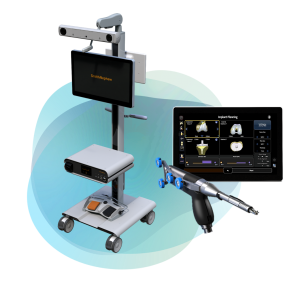Is living with knee pain really living? If you’re one of the estimated 30 million Americans suffering from osteoarthritis, discover how knee replacement using CORI◊ Surgical System robotic assistance may help you return to the activities you love.
Our physicians use the CORI◊ Surgical System to perform robotics-assisted partial knee replacement. They chose this technology because it allows them to individualize each patient’s knee replacement surgery, and use robotic assistance for accurate results.
With the CORI◊ Surgical System, there is no special pre-operative preparation or post-operative recovery protocol. The CORI◊ Surgical System does not perform the procedure. Rather, it assists the surgeon by providing accuracy – crucial to the success of the surgery.
- Lower Post Operative Pain
- Lower Risk of Complications
- Minimally Invasive Surgical Techniques
- Smaller Implants
- Less Removal of Bone and Cartilage



